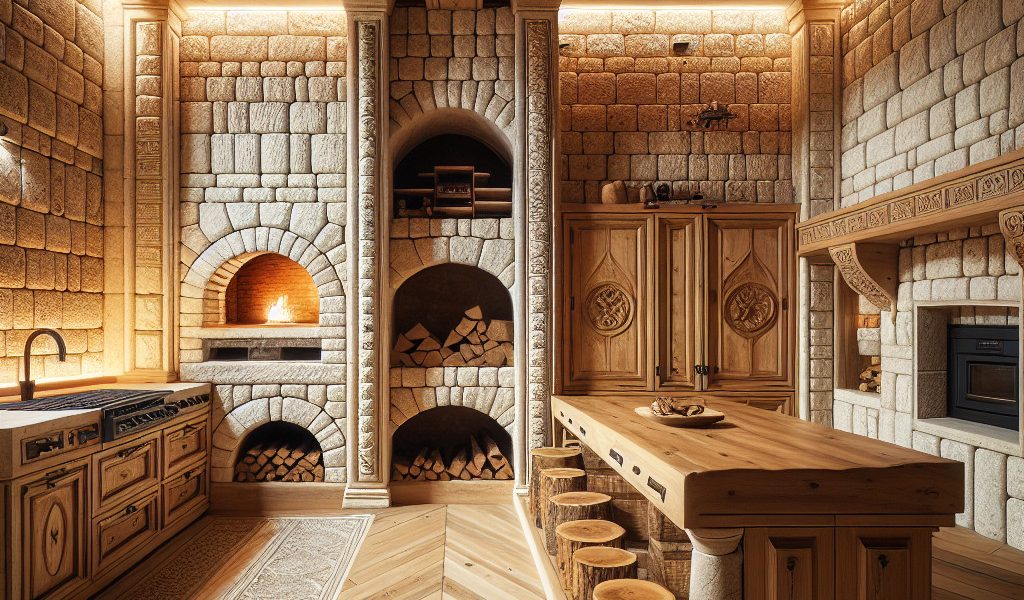Refined Endurance: The Masonry Kitchen – A Classy and Lasting Addition to Your Home Interior
Introduction to masonry cooking
In the field of interior design, the masonry kitchen is gaining popularity among homeowners wishing to combine aesthetics and durability. This type of kitchen is characterized by its construction in solid materials such as brick, concrete or stone. In this article, we offer you a complete overview of the advantages and disadvantages of this trend as well as advice for successfully installing a masonry kitchen in your home.
The advantages of a masonry kitchen
- Strength and durability: The materials used in the construction of a masonry kitchen offer excellent resistance to impact, wear and temperature variations. This will make your kitchen less prone to damage over time.
- Sustainability: Once installed, a masonry kitchen can easily be renovated or modified without needing to demolish everything. It is generally enough to change the coverings (tiles, paint) to give your culinary space a facelift.
- Energy savings : The massive structure of masonry kitchens also allows for better thermal insulation. This helps to reduce heat loss and therefore your energy consumption.
- Aesthetic : The masonry kitchen offers a wide choice in terms of design and finishes. Whether you prefer rustic or modern style, it is possible to adapt the design according to your tastes and needs.
The disadvantages of a bricked kitchen
- Weight : The materials used in the construction of a masonry kitchen are generally heavy. It is therefore important to ensure that your floor can support this additional load before embarking on this type of project.
- Cost : While the masonry kitchen has undeniable advantages in terms of durability, its initial cost can be higher than that of a traditional kitchen kit. However, it is important to take into account the savings made in the long term thanks to its resistance and durability.
- Installation time: Creating a masonry kitchen requires time and specific skills. It will therefore be necessary to allow a longer time for installation compared to a classic kitchen.
Find the right professional to install a masonry kitchen
In order to guarantee the success of the project, it is essential to call on a professional experienced in the installation of masonry kitchens. He will be able to advise you on the materials to favor, the design and layout of your kitchen. Do not hesitate to request several quotes to compare services and find the best value for money.
Tips for successfully installing a masonry kitchen
- Choose your materials wisely: Brick, concrete and stone are common options when it comes to masonry kitchen construction. Each material has its advantages and disadvantages, so it is important to choose the one that best suits your needs and preferences.
- Think about the work plan: The choice of worktop is crucial in a masonry kitchen. Choose a material resistant to thermal shock (such as granite or ceramic) to avoid damage due to temperature variations.
- Don’t forget the lighting: Good lighting is essential in a functional kitchen. Consider integrating direct (recessed spotlights) and indirect (suspended lights) light sources to create a pleasant atmosphere while making your culinary tasks easier.
- Think about storage: Built-in kitchens generally offer less space for storing your utensils than traditional kit kitchens. It is therefore essential to optimize every available centimeter by installing custom shelves, drawers or even cupboards.
Conclusion
The masonry kitchen is an interesting option for those looking for an interior design that is both elegant and durable. Although its initial cost may be higher than that of a traditional kitchen, its advantages in terms of resistance, durability and energy savings are undeniable. Do not hesitate to consult an experienced professional to support you in your project and thus benefit from a kitchen adapted to your needs and preferences.
